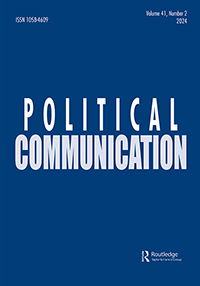影响者作为授权代理人?追随政治影响者、内部政治效能与青年参与
IF 4.6
1区 社会学
Q1 COMMUNICATION
引用次数: 3
摘要
摘要影响力人物以其在社交媒体上的名气而闻名,他们以代言品牌而闻名,但也在制作政治内容,这些内容已被证明能引起年轻人的共鸣。然而,关于他们的政治信息如何影响年轻人的政治参与的研究仍然很少。为了解决这一空白,我们在16至25岁的青年中进行了一项两波小组研究(N W2=496),以调查以下政治影响者、青年的内部政治效能和政治参与之间的联系。我们从传播和舆论领导力文献的两步流中得出结论,解释影响者对年轻人政治行为的影响。此外,我们提出了一个理论论点,即有影响力的人不仅可以传播政治新闻,还可以让年轻人更容易理解。因此,有影响力的人可能会提高年轻人对政治自我能力的信心,从而影响他们的政治参与水平。我们发现,追随者的内部政治效能是通过在影响者对政治的中度到高度简化程度上追随政治影响者来预测的。然而,内部政治效能和政治参与之间没有联系,这可以通过影响者对年轻人的直接和短期动员作用来解释。总的来说,我们的研究结果对当代理解中介背景下的意见领导力具有重要的理论意义。本文章由计算机程序翻译,如有差异,请以英文原文为准。
Influencers as Empowering Agents? Following Political Influencers, Internal Political Efficacy and Participation among Youth
ABSTRACT Influencers, characterized by their social-media-made fame, are known for endorsing brands, but are also producing political content, which has been shown to resonate with youth. However, research on how their political messages impact young people’s political involvement is still scarce. To address this lacuna, we conducted a two-wave panel study (N W2 = 496) among youth aged 16 to 25 years to investigate links between following political influencers, young people’s internal political efficacy, and political participation. We draw from the two-step flow of communication and opinion leadership literature to explain influencers’ impact on young people’s political behavior. Moreover, we advance the theoretical argument that influencers may not only relay political news, but also render it more comprehensible for youth. Influencers may thereby raise young people’s confidence in their political self-competence, and consequently affect their level of political participation. We find that followers’ internal political efficacy is predicted by following political influencers at moderate to high levels of perceived simplification of politics by influencers. However, there is no link between internal political efficacy and political participation, which may be explained by influencers’ direct and short-term mobilizing effect on young people. Overall, our findings have important theoretical implications for contemporary understandings of opinion leadership in mediated contexts.
求助全文
通过发布文献求助,成功后即可免费获取论文全文。
去求助
来源期刊

Political Communication
Multiple-
CiteScore
13.90
自引率
2.70%
发文量
30
期刊介绍:
Political Communication is a quarterly international journal showcasing state-of-the-art, theory-driven empirical research at the nexus of politics and communication. Its broad scope addresses swiftly evolving dynamics and urgent policy considerations globally. The journal embraces diverse research methodologies and analytical perspectives aimed at advancing comprehension of political communication practices, processes, content, effects, and policy implications. Regular symposium issues delve deeply into key thematic areas.
 求助内容:
求助内容: 应助结果提醒方式:
应助结果提醒方式:


